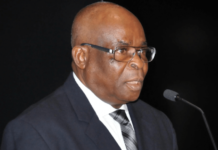
(adsbygoogle = window.adsbygoogle || []).push({});
 |
| ‘Fisayo Soyombo |
When Acting President Yemi Osinbajo announced the appointment of a new chairman and board of the Independent Corrupt Practices and other related offences Commission (ICPC), all eyes were supposed to be on two men: Ekpo Nta and Bolaji Owasanoye.
(adsbygoogle = window.adsbygoogle || []).push({});
Nta, substantive ICPC Chairman since 2012, was apparently not the favourite of some powerful people in the presidency, and there seemed to be some hurry to show him the way out. His “removal” was rumoured many times; in one barefaced attempt by Nta’s detractors to cause confusion, a Vanguard journalist was led into believing that his sack had been approved by the presidency and he had in fact picked a date to deliver his valedictory address to staff of the commission. It was all a ruse. The journalist received a query from his bosses but managed to retain his job. That was in October 2016.
With the benefit of hindsight, that journalist must now be telling himself he didn’t get it wholly wrong. Nta’s appointment was scheduled to lapse in November; this is early August and he has been reassigned — although ‘demoted’ is the tempting word to use — to another agency: the National Salaries, Incomes and Wages Commission. Ever heard of that before?
Nta himself would not be surprised that a few power brokers were eager to see his back; it’s pretty much the story of anti-corruption warfare in Nigeria: corruption doesn’t stare at you when you fight it; it fights back, it bites. Those who know Nta well say it is hard, if not impossible, to find a splotch in his reputation. In addition, he will bow out quietly, with the same furtiveness with which he ran the office. Ordinarily, his redeployment ought to have thrust him into limelight one final time, but the public didn’t seem to notice him.
Neither do they seem to have taken adequate notice of Bolaji Owasanoye, the man poised to assume the office — unless the senate says no. The initial reaction to Owasanoye’s appointment was whether his undisputable academic brilliance would be enough to make him succeed on the job. He graduated from university at 21, became a Master’s degree holder at 24, became a professor at 38, but can we rate his moral presence and leadership competence that highly? That conversation was still gathering traction when the bad news spilled: two people appointed alongside Owasanoye to the ICPC board were of questionable character; the ICPC was in fact on the cusp of charging one of them to court!
The first, Maimuna Aliyu, is the subject of a longstanding case of abuse of office, misappropriation and diversion of public funds. A series of heavy petitions by Aso Savings and Loans Plc, where she was Executive Director, Marketing, accuse her, among many others, of converting to personal use a total of N58 million being proceeds of the sale of three plots of land belonging to Aso Savings; selling three plots of company land for N40 million each (instead of N19 million) and holding on to the N120million; refusal to paya mortgaged facility of N40 million to purchase five houses — four-bedroom detached mansionettes — yet refusing to give them up; and illegally allocating a company house worth N210m to her son. Asides the ICPC, the Police and the EFCC had both indicted her.
The second, Sa’ad Alanamu, is believed to have been planted in ICPC by Senate President Bukola Saraki. He is being investigated for allegedly collecting bribes from contractors handling TETFUND contracts, which he approved as Chairman of the board of Kwara State College of Education, Ilorin.
These allegations, alongside the revelation that security check was not run on the appointees, have sparked public outrage against Osinbajo, some commentators already willing to withdraw all the plaudits they had accorded him in President Muhammadu Buhari’s absence. Osinbajo is a man of immense and uncommon wisdom, which is why it is easy to see why many are missing the basis of his latest appointments. He has recognised the failure of past efforts to fight corruption with anti-corruption. Examples abound.
Very soon, it will be a year since the senate first turned down a request from Buhari for the confirmation of Ibrahim Magu as substantive EFCC Chairman. There has been a second rejection also. Citing a DSS report containing contestable allegations, the senate claimed Magu was unfit for the job. The allegations against Magu are in order, because there’s not one EFCC Chairman who hasn’t been faced with allegations of corruption. While not all of the past chairmen are clean, the DSS allegations against Magu were further investigated and found to be petty and unsubstantiated.
Behind the scenes, even the senators know that Magu as EFCC Chairman is bad news for them. Magu’s reputation is that of a ruthless, soulless investigator; during Nuhu Ribadu’s tenure, during which Magu was famed for being EFCC’s “engine room”, past governors fretted if they found out they were to be grilled by him. Anyone but Magu was what they wanted. This is exactly why, as Dino Melaye admitted recently, anyone but Magu should be EFCC chairman.
Hameed Ali, Comptroller-General of the Nigeria Customs Service (NCS), is someone else in this government with a well-known aversion to corruption. Contrary to public knowledge, Ali’s uniform-or-no-uniform clash with the senate was not sparked by the seizure of an undervalued and improperly-cleared bulletproof Range Rover Sports Utility Vehicle (SUV) that was later found out to be owned by Saraki. The real spark was that Ali’s appointment as Customs CG marked the end of a number of business-as-usual importation practices; the beneficiaries — many of them highly-placed in this government — soon began plotting his ouster from the office. Ali may have not been removed, but he was thoroughly embarrassed by the uniform saga.
Embarrassments like Ali’s or legislature-executive face-offs like Magu’s are what Osinbajo was trying to avoid when he named Aliyu and Alanamu on the ICIPC board. Aliyu may still be innocent in the eyes of the law, but unlike Magu who was falsely accused of living in a house paid for by a corrupt associate of his, the allegations against her are truly weighty. It must count for something that three anti-corruption/security agencies all indicted her at separate times. Osinbajo must be wondering how someone like Aliyu, with her record of taking over company property, can sit on the board of ICPC without spotting similar abuse of office by other public officials. The more corrupt officials we have in agencies like ICPC and EFCC, the harder it is for corruption to escape notice. As popularly said in Yorubaland, the fish is sometimes safest when policed by a cat — there just can be no justification for disappearance!
In any case, Osinbajo is not the originator of the corruption-for-corruption theory. Look no further than the legislature, specifically the House of Representatives, which entertained an ‘amnesty for treasury looters’ only last month.
Officially ‘A Bill For An Act To Establish A Scheme To Harness Untaxed Money for Investment Purposes And To Assure Any Declarant Regarding Inquiries And Proceedings Under Nigerian Laws And For Other Matters Connected Therewith’, it was first read in June and it scaled second reading in July.
Linus Okorie, sponsor of the bill, wants the law to “allow all Nigerians and residents who have any money or assets outside the system or have acquired such money or assets illegally (looted or any variant of the cliché) to come forward, within a set time-frame, to declare same, pay tax/surcharge and compulsorily invest the funds in any sector of the Nigerian economy; and be granted full amnesty from inquiry/prosecution”. To cut the long story short, the bill will shield looters of public funds from prosecution — on the one condition that they reinvest the loot in the economy. In Okorie’s mind, the bill seeks to use corruption to dissuade corruption. Intelligent thinking, isn’t it?
This is pretty much the summary of our anti-corruption campaign: corruption has become so entrenched in our system that the few incorruptible public servants will be drowned by the sheer might of the forces of corruption. It is clear that incorruptibility is in the minority and will never defeat the corruption in the majority. Therefore, the ingenious thing to do is to seek solutions for corruption by looking within corruption. Osinbajo has done just that with the ICPC board appointments. Rather than pillory and harangue him, we should applaud him. The more cats we can lure into exalted positions, the safer the fish!
•Soyombo, Editor of the International Centre for Investigative Reporting (ICIR), tweets @fisayosoyombo










